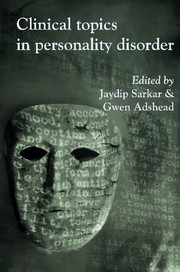Book contents
- Frontmatter
- Contents
- List of tables
- List of boxes
- List of figures
- List of contributors
- Foreword
- Part 1 The nature of the problem
- Part 2 Management and general treatment approaches
- 9 Assessment of personality disorder
- 10 Diagnosis and classification of personality disorder: difficulties, their resolution and implications for practice
- 11 Murmurs of discontent: treatment and treatability of personality disorder
- 12 Personality disorder: its impact on staff and the role of supervision
- Part 3 Specific treatment approaches
- Index
9 - Assessment of personality disorder
from Part 2 - Management and general treatment approaches
Published online by Cambridge University Press: 02 January 2018
- Frontmatter
- Contents
- List of tables
- List of boxes
- List of figures
- List of contributors
- Foreword
- Part 1 The nature of the problem
- Part 2 Management and general treatment approaches
- 9 Assessment of personality disorder
- 10 Diagnosis and classification of personality disorder: difficulties, their resolution and implications for practice
- 11 Murmurs of discontent: treatment and treatability of personality disorder
- 12 Personality disorder: its impact on staff and the role of supervision
- Part 3 Specific treatment approaches
- Index
Summary
Summary It is important that personality disorders are properly assessed as they are common conditions that have a significant impact on an individual's functioning in all areas of life. Individuals with personality disorder are more vulnerable to other psychiatric disorders, and personality disorders can complicate recovery from severe mental illness. This chapter reviews the classification of personality disorder and some common assessment instruments. It also offers a structure for the assessment of personality disorder.
Historically, health professions have not always agreed on how best to conceptualise, categorise and define personality disorders. Although there are still many divergent views, there has been an increased consensus following the publication of definitions of personality disorder in ICD-10 (World Health Organization, 1992) and DSM-IV (American Psychiatric Association, 1994). In 2003, the Department of Health, in conjunction with the National Institute for Mental Health in England, produced Personality Disorder: No Longer a Diagnosis of Exclusion (National Institute for Mental Health in England, 2003). This document outlined the need for provision of mental health services (both general and forensic) for people with a diagnosis of personality disorder, and emphasised the importance of practitioners having skills in identifying and assessing personality disorder in order to appropriately treat a person's difficulties.
Prevalence and comorbidity of personality disorders
Personality disorders are common conditions (Coid et al, 2006a) that, by definition, run a prolonged course and are often associated with poor outcome (Stone, 1993; Skodol et al, 2005) and increased mortality (Harris & Barraclough, 1998). In a general population study of British households, Coid et al (2006a) found a weighted prevalence of 4.4% for a diagnosis of any personality disorder. The weighted prevalence for each individual personality disorder varied between 0.06 and 1.9%, with obsessive–compulsive, avoidant, schizoid and borderline subtypes being the most common. Dependent and schizotypal personality disorders were the least prevalent (the study identified no cases of histrionic or narcissistic personality disorder, suggesting that these disorders are particularly rare in the general population). Comorbidity within personality disorders is common; thus, patients with personality disorder are likely to fulfil diagnostic criteria for more than one subtype of personality disorder. In Coid et al's (2006a) sample, 54% had only one personality disorder, 22% had two, 11% had three and 14% had between four and eight personality disorders.
- Type
- Chapter
- Information
- Clinical Topics in Personality Disorder , pp. 139 - 155Publisher: Royal College of PsychiatristsPrint publication year: 2012

